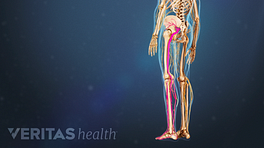A two-step screening process is typically used to determine whether a person is a good candidate for spinal cord stimulation. The first step is based on the person’s medical condition and begins with a thorough assessment by the doctor.
See How to Select a Spine Surgeon
Chronic Pain Conditions Treated with Spinal Cord Stimulation
A general condition known as failed back surgery syndrome is one of the most common reasons spinal cord stimulation is used. The term describes chronic pain after one or more back or neck surgeries fails to alleviate persistent low back pain, leg pain (sciatica or lumbar radiculopathy) or arm pain (cervical radiculopathy).
See Treatment for Failed Back Surgery Syndrome Video
The therapy also has the potential to alleviate pain related to the following conditions:
- Arachnoiditis, painful inflammation and scarring of the meninges (protective layers) of the spinal nerves
- Chronic back pain with or without leg pain
See Types of Back Pain: Acute Pain, Chronic Pain, and Neuropathic Pain
- Chronic neck pain with or without arm pain
- Complex regional pain syndrome, a chronic progressive disease characterized by severe pain and swelling
- Peripheral neuropathy, a constant burning pain of the legs caused by the most distant nerves dying off
- Complex regional pain syndrome (reflex sympathetic dystrophy), a progressive disease of the nervous system in which patients feel constant burning pain
- Refractory angina, which causes chest pain, shortness of breath, and fatigue
Spinal cord stimulation is recommended for an increasing number of painful health problems, and this is not a comprehensive list of conditions the therapy may help.
See When to See a Surgeon for Low Back Pain
If the person fits the criteria for spinal cord stimulation, the doctor will arrange a trial period—the second step in the screening process—to see how well the temporary therapy eases the individual’s pain.
When Spinal Cord Stimulation Is Not Advised
Spinal cord stimulation and peripheral nerve field stimulation therapy are not for everyone. These therapies are usually not recommended for individuals who:
- Have a systemic infection or infection at the site where the device would be implanted
- Use a demand-type cardiac pacemaker
- Have severe depression or another psychiatric condition that could be contributing to the pain
- Have untreated bleeding disorders
- Have untreated drug addiction issues
Watch Video: Am I a Candidate for Back Surgery?
Medical research indicates that tobacco use is linked to worse outcomes with spinal cord stimulation. Smokers may be advised by the doctor to quit before beginning the therapy. Recreational drug use is also thought to reduce the chance of successful therapy, and should be discussed with the doctor.1
References
- 1.De la cruz P, Fama C, Roth S, et al. Predictors of Spinal Cord Stimulation Success. Neuromodulation. 2015;18(7):599-602.






